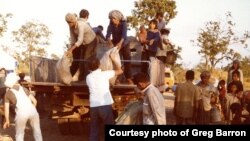A campaign from Oxfam in support of refugees has gained more than 12,000 supporters and garnered more than 20 accounts from Cambodian migrants who have fled conflict in the past.
In an attempt to combat a growing wave of anti-immigration and anti-refugee laws in the developed world and in response to the global refugee crisis, Oxfam Cambodia launched an online campaign, “Jui Knia”, which ended earlier this month.
More than 12,000 people lent their support to the online campaign in solidarity with war refugees.
The campaign concluded with a screening of a film at the Bophana Center in Phnom Penh about a Cambodian-French former refugee who returned to the country.
Man Asisah, a campaigner with Oxfam Cambodia, said the project had encouraged Cambodians who had experienced upheaval due to conflict to tell their stories so they might inspire current asylum seekers to have hope.
She added that the signatures and stories would be submitted to world leaders to try and garner support for better refugee policies.
“The world is facing a world refugee crisis. According to the numbers that Oxfam has collected and study since the end of World War II, there have been more than 65 million people escaping from place to place, from country to country, to seek safe shelter to live their lives in peace,” she said.
“Oxfam hopes that through these support we’ve got from this campaign, world leaders will continue to open their hearts and doors and warmly welcome all refugees from everywhere.”
Phay Siphan, a government spokesman who fled to the United States in 1979, said: “We’ve seen that people who flee from war are in big numbers that we could not even imagine. Political circumstance, and foreign invasions, have turned them into refugees.”
Sok Siphana, a prominent lawyer who featured in the Oxfam project, said he was fortunate to have benefited from his time abroad as a refugee. “I had the chance to work a lot for this society because of the education I received from living abroad. I brought my knowledge back to share with my society,” he said.
Son Chhay, a senior opposition lawmaker who fled Cambodia in the 1980s to live in Australia, said world leaders should welcome refugees as productive members of society.
“If asylum had not been granted, temperately or permanently, we who were refugees at that time would have not have survived,” he said.




